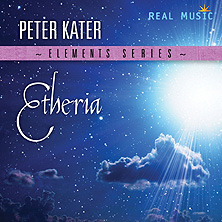 California
based Real Music released part five in the Elements Series by
keyboardist / composer Peter Kater. Featuring 7 tracks, and
clocking in just under one hour, the 2015 CD release of Etheria
is filled with memorable and enchanting instrumental music from
the Hawaii based Kater. Following in the footsteps of Kater's earlier
Elements CD titles Air, Fire, Water and Earth, Etheria
is actually the 5th album in the series even though there are only
four elements so far known to man. Commenting on the album in the
Etheria CD liner notes, Real Music director Terrance Yallop
explains, “Wanting to create a new project, Peter and
I kept referring back to the series until realizing the answer was
right there in part of our conversation. If only there was a fifth
Element! From that arouse the concept of creating an album representing
the vast environment containing both our planet and its elements.
And so Etheria came to be.” Peter Kater’s Etheria
is overflowing with majestic instrumental music made crystal clear
with his signature piano / synth sounds and enhanced by Native American
and bamboo flutes and other heavenly effects. The cover art of Etheria
is quite intriging and overall, the entire CD fits in well within
Real Music's celestial
approach
to ethereal and healing New Age instrumental music.
California
based Real Music released part five in the Elements Series by
keyboardist / composer Peter Kater. Featuring 7 tracks, and
clocking in just under one hour, the 2015 CD release of Etheria
is filled with memorable and enchanting instrumental music from
the Hawaii based Kater. Following in the footsteps of Kater's earlier
Elements CD titles Air, Fire, Water and Earth, Etheria
is actually the 5th album in the series even though there are only
four elements so far known to man. Commenting on the album in the
Etheria CD liner notes, Real Music director Terrance Yallop
explains, “Wanting to create a new project, Peter and
I kept referring back to the series until realizing the answer was
right there in part of our conversation. If only there was a fifth
Element! From that arouse the concept of creating an album representing
the vast environment containing both our planet and its elements.
And so Etheria came to be.” Peter Kater’s Etheria
is overflowing with majestic instrumental music made crystal clear
with his signature piano / synth sounds and enhanced by Native American
and bamboo flutes and other heavenly effects. The cover art of Etheria
is quite intriging and overall, the entire CD fits in well within
Real Music's celestial
approach
to ethereal and healing New Age instrumental music.
www.RealMusic.com
mwe3.com presents an interview with
PETER KATER
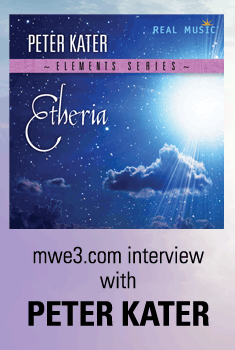 mwe3:
Where do you live now and what you like best about it?
mwe3:
Where do you live now and what you like best about it?
Peter Kater: I’m in Hawaii right now. I’ve lived
all over the place. I had a little concert tour here a few weeks ago.
mwe3: Your latest CD on Real Music is called Etheria. What
inspired the Etheria album and how does it compare and fit
in with the other albums on your Real Music “Elements” series?
I heard you found a fifth element for Etheria.
Peter Kater: Well it’s the fifth one. It’s just
part of the series. It depends on what culture you come from. In the
western culture there’s four elements. In eastern culture there’s
at least five. The fifth element in eastern culture is usually either
metal or it’s ether. Terrence didn’t want to call it “ether”
because ether implies… it could be poisonous. Etheria…
I came up with that name. It’s kind of ethereal… the
cosmos...
mwe3: Do you research the elements before you write about them?
Peter Kater: You just think about the qualities of the specific
element that you’re working on. Water is already fluid and liquid
and changeable. Fire is kind of hot and quick and transforms things.
You just think… and Earth is more grounded and substantial. You
just think of different qualities and you go for it. You make certain
decisions about what the record is going to feel like, and what the
instrumentation is going to be like. It’s largely an intuitive
thing but you kind of use your head to guide you in the right direction.
 mwe3:
Do you write all the music before you go into the studio or do you
go into the studio with basic ideas and then flesh it out more fully?
mwe3:
Do you write all the music before you go into the studio or do you
go into the studio with basic ideas and then flesh it out more fully?
Peter Kater: It really varies per project. Every project is
different. Some projects lean towards improvisation and just develop
organically. Other projects are more structured and you come in with
a melody and some music and some specific ideas and some projects
are more free flowing. It’s always different. The creative process
is something you can't put your finger on. It’s always changing.
There’s a lot of people that don’t really know what that
is but if you’re really connected to being creative in the true
sense of the word, then anything’s possible and it can happen
in any number of ways.
mwe3: You have your own studio I presume. Where did you record
Etheria?
Peter Kater: Uh-huh. This one actually was recorded in
Colorado.
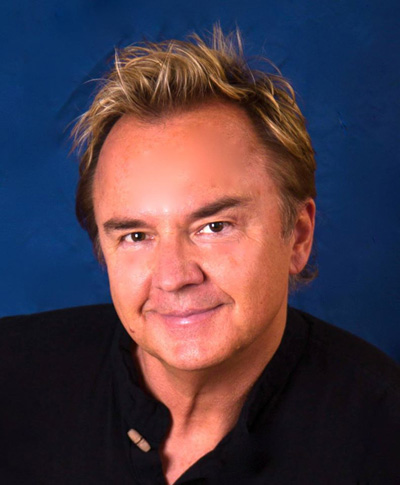 mwe3:
How did you get the choir like effects on the first track on Etheria,
called “Heaven’s Window”? Do you like to use real
voices?
mwe3:
How did you get the choir like effects on the first track on Etheria,
called “Heaven’s Window”? Do you like to use real
voices?
Peter Kater: Sometimes I use real voices and enhance them with
sampled voices. It varies a lot per project. This project kind of
came out of the vocal idea to a large degree, in the first place.
So I kind of built a lot of the ideas around the vocals.
mwe3: Are you very much into the New Age philosophy of Real
Music or do you see yourself as more of a modern day classical composer.
Peter Kater: My music is a reflection of me. It’s a reflection
of where I’m at, what I’m feeling, what I’m learning
in life and what I feel like communicating or exploring. So I don’t
try to be anything other than myself. Certain projects work better
for different labels. I didn’t know what I was going to do for
them when they brought up the idea of doing a fifth record. And I
think we were both actually expecting something different than what
actually happened. Fortunately, they're open to what it is, that I
did, and I think it turned out really good. I’m more committed
to my muse than anything else so whatever is coming through at the
time is what I go for. I don't really try to manipulate it too much.
I try to keep true to my creative instincts and passion and do what
feels like the next thing to do rather than try and control it.
mwe3: Some musicians say they’re just a conduit for the
music. They just let the music flow through them like a channel.
Peter Kater: Yeah, that’s pretty much what I’m saying.
mwe3: You’ve been on a number of music labels. So how
did you become involved with Real Music? Did they seek you out or
did you seek them out?
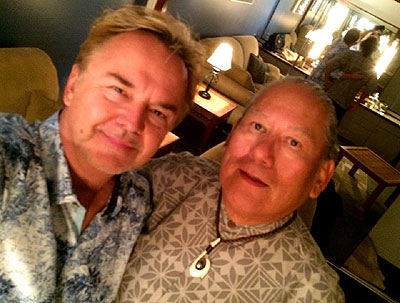 Peter
Kater: I don’t remember who sought who out first. When you’ve
been in the business as long as I have, it’s kind of a small
world. You kind of know everyone and you kind of know a lot of the
labels and what they’re doing. Like you said, I do projects for
a lot of different companies. I like it that way. I like diversity.
I like being able to do whatever I want. I don’t like being told
what to do creatively. So it works for me to have different outlets
and have different projects coming out on different companies at different
times.
Peter
Kater: I don’t remember who sought who out first. When you’ve
been in the business as long as I have, it’s kind of a small
world. You kind of know everyone and you kind of know a lot of the
labels and what they’re doing. Like you said, I do projects for
a lot of different companies. I like it that way. I like diversity.
I like being able to do whatever I want. I don’t like being told
what to do creatively. So it works for me to have different outlets
and have different projects coming out on different companies at different
times.
mwe3:
When you started recording you were into contemporary jazz. How and
when did you make the shift to more New Age instrumental music? Is
jazz still a part of your style?
Peter Kater: The funny thing is, I never really studied jazz
and when I started charting on the jazz charts, and all that kind
of stuff, it was kind of a surprise for me. And that was really the
early stages of my career. I was still kind of exploring what it is
I wanted to do and I was getting a lot of feedback, like I should
do stuff that’s more upbeat and more jazzy, so I kind of walked
down that road for a while. I did it pretty well but I didn’t
really find it particularly satisfying. When I met R. Carlos Nakai
and started working with him and started doing more introspective,
mellow music, I felt a lot more happy inside, and actually sold a
lot more too. So I was happy to let go of the contemporary jazz thing
because I kind of felt that it wasn’t really me…on a deeper
level.
mwe3: Were you influenced by progressive rock when you were
younger or were you coming from more of a jazz / classical background?
Peter Kater: I was largely influenced by progressive rock and
originally classical, which I wasn’t particularly into but you
have to respect it. And then a lot of progressive rock, like you said,
YES and Genesis and all the pop-rock bands of the ’70s and ‘80s.
And classic rock. Then I started listening to some jazz, like Pat
Metheny and Keith Jarrett, Chick Corea, a group called Oregon, The
Paul Winter Consort, Dave Grusin... I really loved a lot of their
stuff. I was largely influenced by Keith Jarrett as far as piano players
are concerned, along with all the other rock and pop piano players
like Elton John and Billy Joel. I like everything. I kind of like
good music. I don’t care what genre it is. There’s certain
things I like and certain things I’m not attracted to. I imagine
that all effects what I play or don’t play.
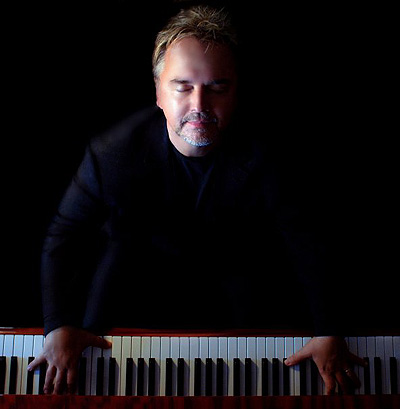 mwe3:
You’ve also done a lot of work in the soundtracks genre. And
I know that soundtrack artists very rarely get the proper recognition.
Do you think soundtrack artists are often overshadowed by the very
film they’re scoring for?
mwe3:
You’ve also done a lot of work in the soundtracks genre. And
I know that soundtrack artists very rarely get the proper recognition.
Do you think soundtrack artists are often overshadowed by the very
film they’re scoring for?
Peter Kater: I guess you could look at it that way. But they’re
doing what they want to do and they’re paid pretty well for it.
A lot of times soundtrack artists make more money than jazz musicians
do. Not as much as pop and rock artists who are successful. They’re
just doing what they want to do and they don’t bemoan it. But
certainly, soundtrack artists they won’t make their name, unless
they’re, like Hans Zimmer or some really well known guys that
you see on a bunch of movies. But I know what you mean.
mwe3: You’ve also done theater scores. Do you prefer writing
for movies or Broadway theater shows?
Peter Kater: I like it all. Diversity is what I really enjoy.
I like it all. I like doing my records. I like doing stuff for film
and TV, theater… It’s all about the quality of the project
and who you’re working with, whether it’s enjoyable and
whether it’s creatively interesting. I’ve worked on some
film projects that were a total nightmare because the directors and
producers weren’t on the same page for what they wanted and then
put me in the middle and it was really a bummer. And I’ve worked
on other projects that were really a joy to work on. It all depends.
mwe3: What were some of the favorite soundtracks that you worked
on?
Peter Kater: Well I tend to like what I worked on most recently
but there was a movie called Sirius that I did the music for
not too long ago, which was kind of a documentary about the energy
crises, extraterrestrial information and involvment and our growth
as a planet. I thought that was really interesting and fun. And then
I did a film called Ten Questions For The Dalai Lama that was
just really beautiful. I really enjoyed working on that. I really
like it all. I tend not to pick favorites.
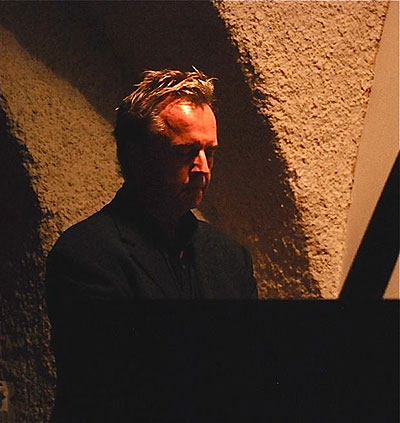 mwe3:
How do you balance your writing and recording with live shows? Do
you pick and choose live shows and do you ever go on tour? Do you
like touring?
mwe3:
How do you balance your writing and recording with live shows? Do
you pick and choose live shows and do you ever go on tour? Do you
like touring?
Peter Kater: I kind of do what I want to do. I’m in charge
of my life and my own schedule. I don’t do things I do don’t
want to do for the most part. I just arrange my schedule the way that
it’s comfortable for me. I have a balance between recording and
touring and time off. I’ve been doing it for a long time…
been doing it for 35 years.
mwe3: So what’s coming next? Etheria came out a
few months ago. Do you have other plans for recording and writing
new music?
Peter Kater: I’m always working. I have a bunch of concerts
planned for the summer. I’m playing some more. I might go over
to Japan in August. I’ve got some concerts brewing in Europe
in October. I’ve got a record coming out in a couple of weeks.
I’m going to be working on some stuff towards the end of the
year. Pretty busy.
mwe3: Are you hopeful for planet Earth. It looks like a rough
year. Are you hopeful for the future?
 Peter
Kater: Yeah, I’m optimistic. I think humankind is a survivor
and we make mistakes but I think when it comes down to it we have
a good conscience , we share information. Stuff like that is awkward
and hard but I think we’re going to pull through.
Peter
Kater: Yeah, I’m optimistic. I think humankind is a survivor
and we make mistakes but I think when it comes down to it we have
a good conscience , we share information. Stuff like that is awkward
and hard but I think we’re going to pull through.
mwe3: You make a lot of people happy with your music. That’s
what it’s all about.
Peter Kater: If I’m doing that, then I guess I’m
doing my job, right?



